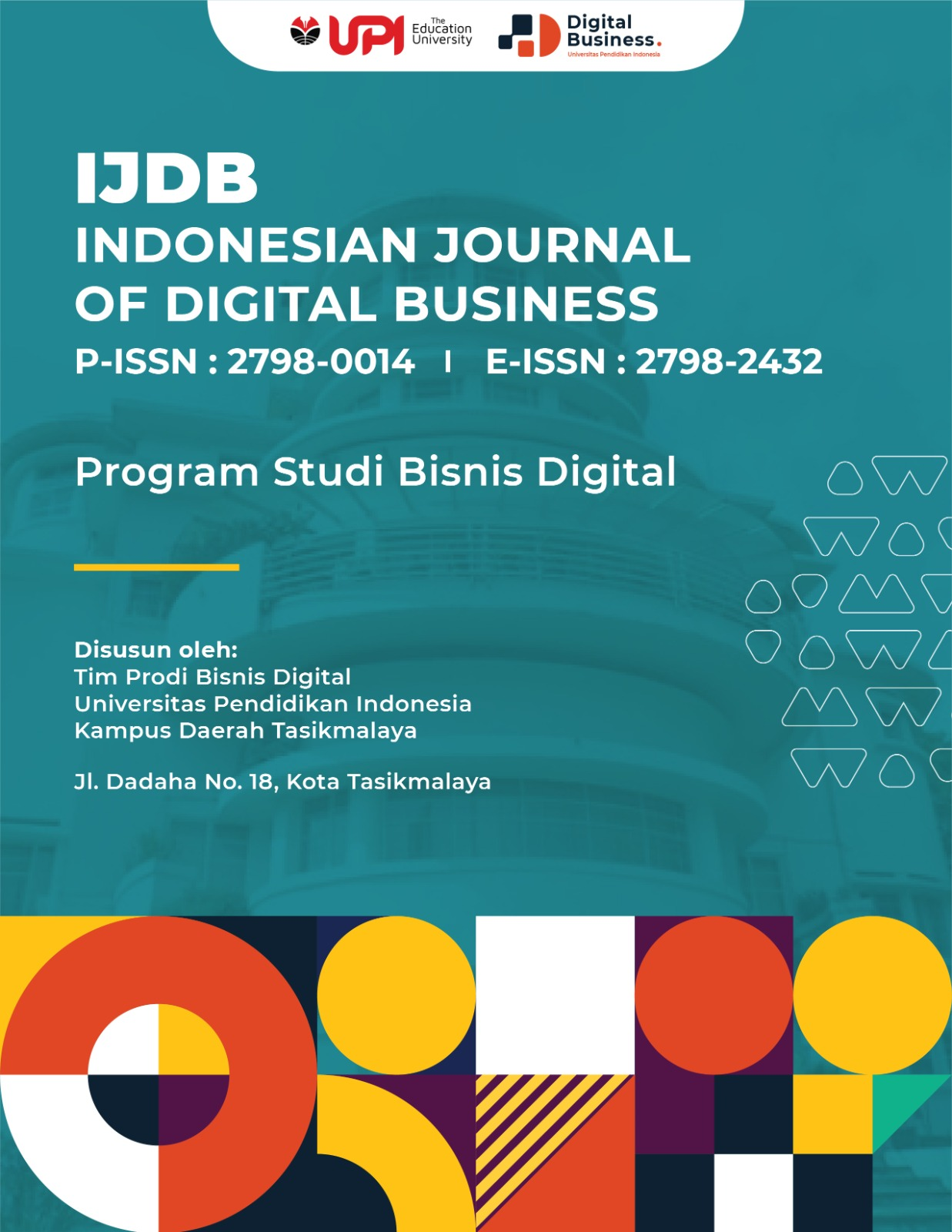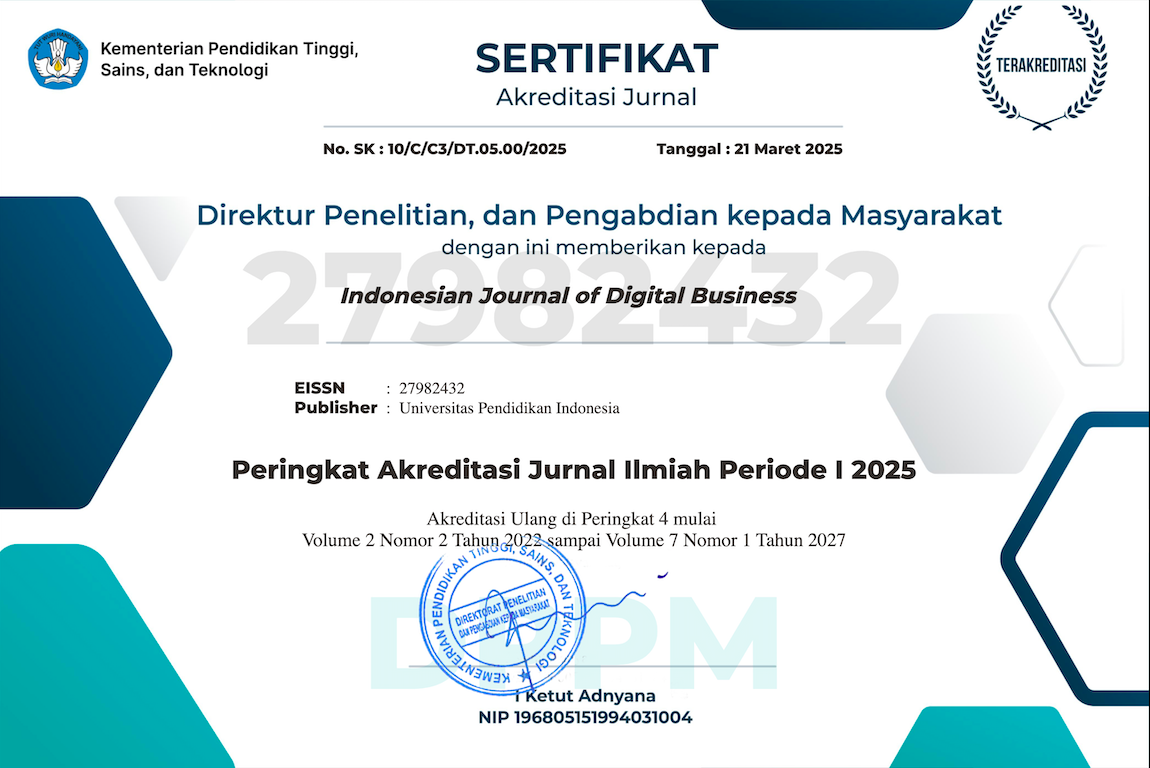Analyzing User Sentiment Toward the New TikTok Go Feature in Indonesia
Abstract
This study aims to analyze user sentiment toward the new TikTok Go feature in Indonesia using a descriptive quantitative approach based on social media sentiment analysis. The data were obtained from 335 user comments on TikTok, Twitter, and Instagram discussing the TikTok Go feature, collected through web scraping techniques during the period from May to July 2025. The data analysis process involved several stages, including text preprocessing, sentiment classification, frequency analysis, keyword extraction using TF-IDF, and thematic analysis. The results show that the majority of user sentiment was negative (74%), followed by neutral sentiment (19%) and positive sentiment (7%). The dominant themes found in the comments included difficulties in accessing the TikTok Go feature (55%), challenges in gaining the required number of followers (44%), account violations (6%), and general questions related to the feature's mechanism (3%). The triangulation of data from multiple platforms reinforced the consistency of the findings. These findings highlight the importance of more transparent and educational communication strategies to support the adoption of digital innovation. It is recommended that TikTok simplify the feature activation process and clarify technical requirements in order to enhance user experience and increase the successful adoption of TikTok Go in Indonesia.
Keywords
Full Text:
PDFReferences
Alamanda, D. T., Kania, I., Ramdhani, A., Susilawati, W., & Hadi, E. S. (2023). Sentiment Analysis Using Text Mining of Indonesia Tourism Reviews via Social Media. Garut University.
Alaei, A. R., Becken, S., & Stantic, B. (2019). Sentiment analysis in tourism: Capitalizing on big data. Journal of Travel Research, 58(2), 175–191. https://doi.org/10.1177/0047287517747753
Anderson, M., & Jiang, J. (2022). Teens, social media and technology. Pew Research Center.
Aversa, P., Cabantous, L., & Haefliger, S. (2021). Entrepreneurship and the platform economy. Organization Studies, 42(4), 599–621.
Dwivedi, Y. K., Hughes, D. L., Coombs, C., Constantiou, I., Duan, Y., Edwards, J. S., ... & Williams, M. D. (2021). Setting the future of digital and social media marketing research. International Journal of Information Management, 59, 102168. https://doi.org/10.1016/j.ijinfomgt.2020.102168
Flick, U. (2018). An introduction to qualitative research (6th ed.). Sage.
Kapoor, K., Tamilmani, K., Rana, N. P., Patil, P., Dwivedi, Y. K., & Nerur, S. (2022). Advances in social media research: Past, present and future. Information Systems Frontiers, 24(3), 627–652. https://doi.org/10.1007/s10796-021-10180-0
Luo, X., Zhang, J., & Duan, W. (2019). Social media and firm equity value. Information Systems Research, 30(1), 236–254. https://doi.org/10.1287/isre.2018.0788
Mariani, M., Filieri, R., & Jiang, Y. (2023). The role of trust in online customer engagement. Journal of Business Research, 154, 113308. https://doi.org/10.1016/j.jbusres.2022.113308
Martin, K., & Murphy, P. E. (2021). Data ethics: Implications for digital marketing. Journal of Business Research, 122, 853–864. https://doi.org/10.1016/j.jbusres.2020.05.018
McHugh, M. L. (2018). Interrater reliability: The kappa statistic. Biochemia Medica, 22(3), 276–282. https://doi.org/10.11613/BM.2012.031
Statista. (2023). Number of TikTok users worldwide and in Indonesia. Retrieved from https://www.statista.com/statistics/1100832/tiktok-users-worldwide/
Stieglitz, S., Mirbabaie, M., Ross, B., & Neuberger, C. (2018). Social media analytics – Challenges in topic discovery, data collection, and data preparation. International Journal of Information Management, 39, 156–168. https://doi.org/10.1016/j.ijinfomgt.2017.12.002
Stoldt, R., Wellman, M., Ekdale, B., & Tully, M. (2022). Professional boundary work in the digital economy: TikTok and the platformization of creative labor. New Media & Society, 24(9), 2167–2185. https://doi.org/10.1177/1461444820931047
Susanti, D., Riyanto, S., & Kumorohadi, D. (2021). The impact of digital transformation on business performance: A systematic literature review. International Journal of Advanced Science and Technology, 30(3), 797–808.
Verhoef, P. C., Broekhuizen, T., Bart, Y., Bhattacharya, A., Dong, J. Q., Fabian, N., & Haenlein, M. (2021). Digital transformation: A multidisciplinary reflection and research agenda. Journal of Business Research, 122, 889–901. https://doi.org/10.1016/j.jbusres.2019.09.022
Xu, X., Chen, L., & Zhang, R. (2023). Transparency and fairness in platform services. Information & Management, 60(1), 103681. https://doi.org/10.1016/j.im.2022.103681
DOI: https://doi.org/10.17509/ijdb.v5i1.83068
Refbacks
- There are currently no refbacks.
Copyright (c) 2025 Universitas Pendidikan Indonesia (UPI)

This work is licensed under a Creative Commons Attribution-ShareAlike 4.0 International License.
Indonesian Journal of Digital Business is published by Universitas Pendidikan Indonesia (UPI)
and managed by Department of Digital Business
Jl. Dr. Setiabudi No.229, Kota Bandung, Indonesia - 40154
View My Stats





1.png)